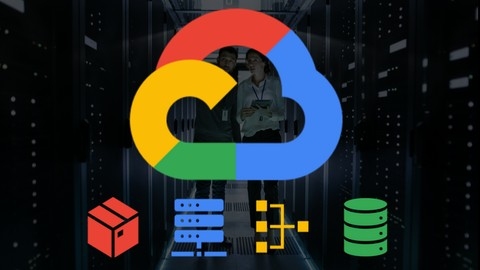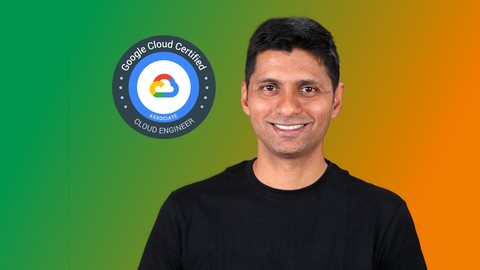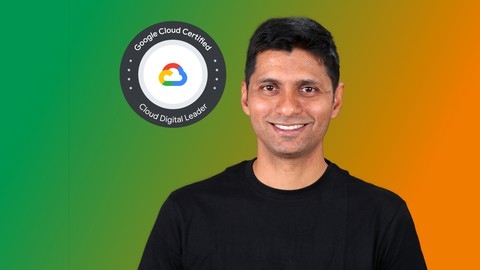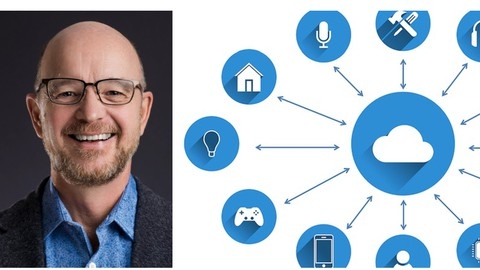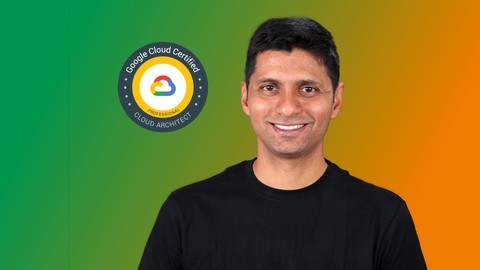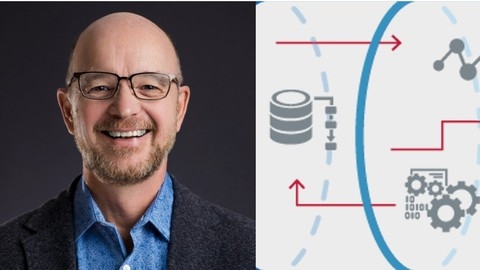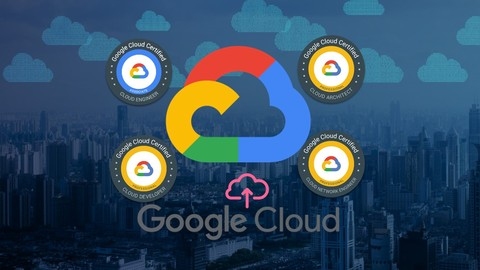Google Cloud Platform (GCP) Fundamentals for Beginners
This course provides a comprehensive overview of Google Cloud Platform, covering all the key services and concepts.
It starts with an introduction to GCP, giving you the big picture of the platform’s core building blocks and most important services like Compute Engine, App Engine, Kubernetes Engine, and Cloud Functions.
You’ll learn how to sign up, access resources through channels like Cloud Shell, and structure resources within GCP.
The course dives deep into GCP’s compute services, teaching you when to use Compute Engine VMs, App Engine, Kubernetes Engine, or Cloud Functions based on your requirements.
You’ll get hands-on experience launching a Compute Engine instance.
For storage needs, it covers Cloud Storage for object storage, Persistent Disks for block storage, and Cloud Filestore.
A demo walks you through creating a Cloud Storage bucket and uploading data.
Networking is crucial, so you’ll learn about network tiers, load balancing with HTTP and TCP load balancers, setting up a Virtual Private Cloud (VPC), and enabling hybrid connectivity with Cloud Interconnect, VPN, and peering.
There’s even a demo configuring an HTTP load balancer.
Identity and access management (IAM) is thoroughly explained, covering members, roles, permissions, and service accounts, with a practical demo.
The course also covers database services like Cloud SQL, Bigtable for NoSQL big data, Cloud Spanner for mission-critical relational data, and Cloud Memorystore for redis.
You’ll provision a Cloud SQL instance.
For data analytics, you’ll explore services like BigQuery, Cloud Pub/Sub for messaging, Dataflow for batch/stream processing, Dataproc for hadoop/spark, and Datalab IDEs.
A BigQuery demo shows analyzing data.
Artificial intelligence (AI) and machine learning (ML) are hot topics, so the course introduces AI building blocks, AutoML for custom ML models, the AI Platform, and the AI Hub.
An engaging demo uses the Cloud Vision API for image recognition.
The DevOps services covered include Cloud Source Repositories for storing code, Cloud Build for building artifacts, Container Registry for storing images, and IDE plugins.
You’ll learn to store container images in the registry.
Finally, the course touches on additional services like IoT, API management, hybrid/multi-cloud with Anthos, and migration tools, giving you a well-rounded understanding of GCP’s capabilities.
GCP Associate Cloud Engineer - Google Cloud Certification
This comprehensive course covers all the essential topics you need to prepare for the Associate Cloud Engineer certification exam.
It starts by introducing you to the Google Cloud Platform (GCP) and its key components like regions, zones, and Google Compute Engine (GCE).
You’ll learn how to create and manage virtual machines (VMs), optimize costs with sustained and committed use discounts, and leverage preemptible VMs.
The instructor also guides you through using the gcloud command-line tool to interact with GCP services.
One of the standout sections is on load balancing, where you’ll explore different load balancer types (HTTP, HTTPS, TCP, UDP) and learn how to choose and configure them based on your requirements.
The course dives deep into managed services like Google App Engine, Google Kubernetes Engine (GKE), and Google Cloud Functions, teaching you to deploy and manage applications on these platforms.
Storage is a crucial aspect covered extensively, including block storage (persistent disks, local SSDs), file storage (Filestore), and object storage (Cloud Storage).
You’ll learn about storage classes, versioning, lifecycle management, and encryption using Cloud KMS.
The course also covers databases like Cloud SQL, Cloud Spanner, BigQuery, Firestore, Datastore, BigTable, and Memorystore, helping you choose the right database for your workloads.
Authentication and authorization are essential for secure cloud deployments, and the course dedicates a section to Cloud IAM, exploring roles, members, policies, and service accounts.
You’ll also learn about organizing resources using projects, folders, and organizations, as well as best practices for IAM.
Operations are not overlooked, with sections on monitoring, logging, tracing, debugging, and profiling in GCP.
The course touches on networking concepts like VPCs, subnets, firewall rules, shared VPCs, VPC peering, and hybrid cloud connectivity using Cloud VPN and Cloud Interconnect.
Throughout the course, you’ll encounter hands-on demos, scenarios, and quizzes to reinforce your learning.
The instructor also shares valuable tips on productivity, mindset, and staying relevant in the ever-changing technology landscape.
GCP for Beginners - Become a Google Cloud Digital Leader
The course starts with a solid introduction to cloud computing and GCP, helping you create your first GCP account and understand the concept of regions and zones.
You’ll then dive into Google Compute Engine (GCE), learning how to create and manage virtual machines, set up HTTP web servers, and explore various cost-saving strategies like sustained use discounts, committed use discounts, and preemptible VMs.
As you progress, you’ll discover the power of managed services in GCP, including Google App Engine (GAE), Google Kubernetes Engine (GKE), Google Cloud Functions, and Google Cloud Run.
The course explains the differences between Infrastructure as a Service (IaaS), Platform as a Service (PaaS), and Software as a Service (SaaS), helping you understand the evolution of cloud computing and the benefits of serverless architectures.
Storage is a crucial aspect of any cloud infrastructure, and this course covers it in depth.
You’ll learn about block, file, and object storage in GCP, with hands-on experience using Cloud Storage.
The course also explores various database options, including Cloud SQL, Cloud Spanner, BigQuery, Firestore, and Memorystore, catering to both relational and NoSQL data models.
Security is a top priority in cloud computing, and the course dedicates a significant portion to this topic.
You’ll learn about security threats, Cloud Identity and Access Management (IAM), encryption with Cloud Key Management Service (KMS), and organizing GCP resources using projects, folders, and organizations.
The course also covers hybrid cloud setups using Cloud VPN and Cloud Interconnect.
DevOps practices are essential for efficient cloud operations, and the course dives into continuous integration, deployment, and delivery using GCP services.
You’ll explore infrastructure as code, site reliability engineering (SRE), and best practices for monitoring and logging with Cloud Operations.
The course also covers advanced topics like building loosely coupled applications with Cloud Pub/Sub, architecting big data flows, streaming data processing, and IoT solutions.
You’ll learn about data governance using Dataplex and API management with Apigee and Cloud Endpoints.
Machine learning (ML) and artificial intelligence (AI) are rapidly growing fields, and the course introduces you to ML concepts and how to leverage GCP’s pre-trained models and custom model training capabilities.
You’ll also explore responsible AI principles and the importance of data in ML projects.
The course concludes with a focus on digital transformation using GCP, covering infrastructure modernization, application modernization, and business platform modernization.
You’ll learn about cloud migration scenarios, cost management strategies, and best practices for scaling operations in GCP.
Throughout the course, you’ll encounter real-world scenarios and hands-on demonstrations that reinforce your understanding of the concepts.
The instructor provides clear explanations and practical examples, making it easy to follow along and apply the knowledge to your own projects.
Google Cloud Associate Cloud Engineer: Get Certified 2024
You’ll start by understanding cloud computing concepts and exploring GCP’s core services like Compute Engine, Kubernetes Engine, App Engine, and Cloud Functions.
The course dives deep into Identity and Access Management (IAM), teaching you how to manage access control and create custom roles.
You’ll learn to provision virtual machines, configure machine types, attach disks, and work with managed instance groups for autoscaling.
For containerized workloads, you’ll explore Kubernetes architecture, deploy clusters on GKE, and manage them using kubectl.
The course covers App Engine for deploying applications and Cloud Functions for serverless workloads.
Storage solutions like Cloud Storage, Cloud SQL, Cloud Spanner, Cloud Datastore, Cloud Firestore, and Cloud Bigtable are covered in detail, helping you choose the right option.
You’ll learn about big data services like BigQuery, Dataproc, Dataflow, and Pub/Sub.
Networking concepts like Virtual Private Clouds (VPCs), VPNs, IP addressing, firewalls, load balancing, and DNS are thoroughly explained.
The course also teaches you to use deployment tools like Deployment Manager and monitor applications with Cloud Operations Suite.
Throughout the course, you’ll find quizzes to test your knowledge and a practice exam to prepare for the certification.
With hands-on exercises using Cloud Shell and SDK, you’ll gain practical experience working with GCP services.
GCP Professional Cloud Architect: Google Cloud Certification
This course covers a wide range of topics essential for designing and managing robust, secure, and scalable solutions on the Google Cloud Platform.
It starts with an introduction to Google Cloud Platform (GCP) and guides you through creating a GCP account.
You’ll learn about regions and zones, which are crucial for understanding the geographic distribution of resources.
The course then dives into Google Compute Engine (GCE), covering virtual machines, machine types, images, and networking concepts like IP addresses and load balancing.
You’ll explore managed services like Google App Engine, Google Kubernetes Engine (GKE), and Google Cloud Functions, which enable you to build, deploy, and scale applications efficiently.
The course also covers databases, including Cloud SQL, Cloud Spanner, Cloud Datastore, Cloud Firestore, and BigQuery, equipping you with the knowledge to choose the right database for your workloads.
Storage solutions like Cloud Storage, persistent disks, and file storage are covered in-depth, ensuring you understand how to store and manage data securely.
The course delves into networking concepts like Virtual Private Cloud (VPC), subnets, firewall rules, and hybrid connectivity options like Cloud VPN and Cloud Interconnect.
Security and identity management are crucial topics, and the course explores Cloud Identity and Access Management (IAM), service accounts, and encryption with Cloud Key Management Service (Cloud KMS).
You’ll learn about operations, monitoring, logging, and debugging tools like Cloud Monitoring, Cloud Logging, and Cloud Trace.
The course also covers DevOps practices, including continuous integration, deployment, and infrastructure as code with Cloud Deployment Manager.
You’ll learn about site reliability engineering (SRE) principles, release management strategies, and compliance and regulations like HIPAA and PCI DSS.
Throughout the course, you’ll work on hands-on labs and case studies, allowing you to apply the concepts you’ve learned to real-world scenarios.
The course concludes with exam preparation tips and resources to help you feel confident and ready for the Professional Cloud Architect certification exam.
Google Cloud Productivity - Drive and Google’s Office Suite
This course starts by introducing Google Drive, which allows you to store files in the cloud and access them from anywhere.
You’ll learn the Drive interface inside out, including uploading, sharing, searching, and managing file versions.
The instructor covers handy tips like scanning documents from your phone directly to Drive.
Next up is Google Docs, Google’s online word processor.
You’ll dive into creating, formatting, and collaborating on documents in real-time.
Features like revision history, translation, and voice typing are covered.
The course also shows how to integrate Docs with other Google apps like Gmail.
For spreadsheet lovers, the Google Sheets section is a treat.
From data filtering to creating charts and using formulas, you’ll learn to analyze data like a pro.
The instructor even demonstrates updating Excel files using a Chrome extension.
The Google Slides module teaches you to build visually appealing presentations.
You’ll explore animating objects, presenting remotely via Hangouts, and discovering pre-built templates.
Finally, the Google Forms section is a game-changer for collecting data through surveys or quizzes.
You’ll create forms from scratch, add validation rules, analyze responses in a spreadsheet, and even allow file uploads.
Throughout the course, you’ll pick up pro tips for using add-ons, keyboard shortcuts, and other productivity hacks with Google’s office suite.
Google Cloud Professional Data Engineer: Get Certified 2022
This course starts with an introduction to cloud storage options like Cloud Storage for object storage.
You’ll learn how to load data into Cloud Storage, manage access controls, and use lifecycle policies.
The course then dives into GCP’s relational database offerings - Cloud SQL and Cloud Spanner.
You’ll understand when to use each, how to create databases, monitor them, and optimize performance.
For NoSQL databases, the course covers Cloud Firestore (document database) and Bigtable (wide column database).
You’ll learn about data modeling, indexing, querying, and transactions in these databases.
The analytical database BigQuery is covered in-depth, including data types, nested fields, partitioning, clustering, loading data, and using BigQuery ML for machine learning.
The course also covers data warehousing concepts like assessing current state, schema migration, data pipelines, reporting, and governance.
You’ll learn about caching with Cloud Memorystore and workflow orchestration with Cloud Composer.
For data pipelines, it teaches Cloud Pub/Sub messaging, Cloud Dataflow for stream/batch processing, and Cloud Dataproc for big data processing.
Special considerations like hybrid/multi-cloud, asynchronous messaging, stream processing, and data consistency models are discussed for distributed systems.
Monitoring and logging with Cloud Monitoring/Logging, along with security best practices like IAM, encryption, key management, and data loss prevention are also included.
If you’re interested in machine learning, the course provides an introduction, covering problem types, approaches like neural networks, feature engineering, model building/evaluation, and deploying models with GPUs/TPUs.
It also shows how to use BigQuery ML for creating regression models.
Google Cloud Platform (GCP) - For Techs
The course starts by explaining the basics of GCP, including how to sign up and interact with the platform using the web console and command-line interface (Cloud SDK).
You’ll learn about projects, billing, and initializing the SDK on various operating systems like Linux and Windows.
Next, it dives into Identity and Access Management (IAM), teaching you how to manage permissions, add members, create custom roles, and understand the IAM hierarchy.
This is crucial for securing your cloud resources.
You’ll then explore Google’s regions and zones, which is important for deploying resources close to your users.
The course covers virtual machines (VMs) in depth, including preemptible VMs, committed discounts, images, snapshots, and cloning.
Networking is a major topic, with lectures on Virtual Private Clouds (VPCs), peering, and VPNs.
You’ll learn how to create VPCs, configure multiple network interfaces on VMs, and set up VPC peering.
The course also covers load balancing and autoscaling, essential for building scalable applications.
You’ll learn about Google’s load balancing options and how to configure autoscaling for your workloads.
Content Delivery Network (CDN) is another important topic, covering caching, flushing, and avoiding excessive billing.
The course includes demos on enabling CDN and invalidating the cache.
For data storage, you’ll learn about Cloud Storage, Cloud SQL (for relational databases), Cloud Datastore (NoSQL), and Cloud Spanner (globally distributed database).
The course explains the differences between these options and includes demos on using them.
Ultimate Google Cloud Certifications: All in one Bundle 2023
The course starts with an introduction to Google Cloud Platform (GCP) and its certification paths.
It then dives into the basics, covering GCP’s compute, storage, database, networking, and security services.
You’ll learn about Cloud Console, Cloud Shell, Cloud SDK, and APIs to interact with GCP.
Next, the course prepares you for the Cloud Digital Leader certification by explaining core GCP concepts like Compute Engine, App Engine, Kubernetes Engine, and load balancing.
You’ll gain hands-on experience through labs and quizzes.
For the Associate Cloud Engineer certification, you’ll learn to plan, configure, deploy, and manage cloud solutions.
Topics include setting up environments, configuring compute/storage resources, deploying services, monitoring with Stackdriver, and managing access and security.
The Professional Cloud Developer section teaches you to design scalable and secure cloud-native apps using services like Cloud Storage, Cloud SQL, and Cloud Spanner.
You’ll learn CI/CD pipelines, deployment strategies, troubleshooting, and performance optimization.
The Professional Cloud Architect part covers designing solution architectures, managing infrastructure, ensuring security and compliance, analyzing processes, and advising development teams.
Case studies reinforce the concepts.
The course also covers Professional Cloud DevOps Engineer certification, focusing on bootstrapping GCP organizations, implementing CI/CD pipelines, applying SRE practices, monitoring strategies, and optimizing performance.
Additionally, you’ll find sections on Professional Cloud Network Engineer and Professional Cloud Security Engineer certifications, covering network design, hybrid connectivity, security best practices, regulatory compliance, and more.
The course uses a mix of lectures, demos, labs, and quizzes to ensure you grasp the concepts thoroughly.
The instructors explain complex topics clearly, and you’ll gain practical experience by working on real-world scenarios.
Google Cloud Associate Cloud Engineer Practice Tests
The course consists of three practice exams, each containing 50 questions that assess your understanding of various Google Cloud Platform (GCP) concepts and skills.
You’ll be tested on setting up cloud environments, which likely covers topics like creating projects, managing resources, and configuring access controls.
Planning compute, storage, and network operations is another key area, so you can expect questions related to deploying virtual machines, managing storage solutions, and configuring networking components like load balancers and VPNs.
Deploying applications and services on GCP is also covered, potentially including containerization with Google Kubernetes Engine (GKE) and serverless computing with Cloud Functions.
The course will evaluate your ability to use monitoring and logging services like Cloud Monitoring, Cloud Logging, and Error Reporting to gain insights into your cloud infrastructure and applications.
Importantly, the practice exams will test your knowledge of implementing security best practices on GCP.
This could involve topics like managing access controls with Identity and Access Management (IAM), securing data with encryption keys, and following security best practices for specific services like Cloud Storage or GKE.
With three comprehensive practice exams, this course provides a great opportunity to assess your readiness for the Google Cloud Associate Cloud Engineer certification exam.
By simulating the actual exam experience, you can identify areas where you need further study and gain confidence in your GCP skills.
